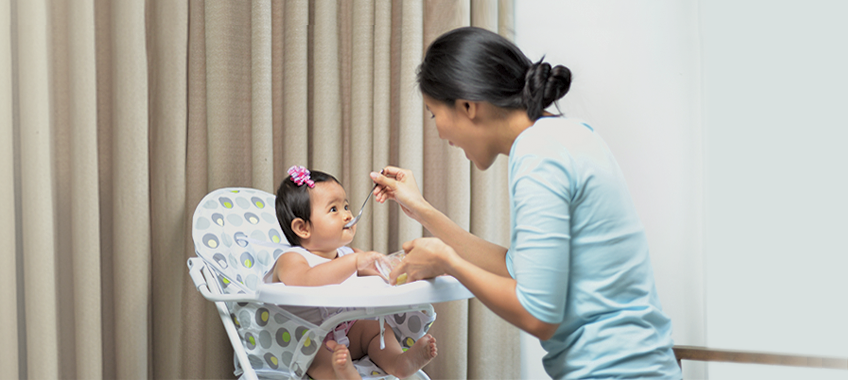Baby’s First Solid Meal: Things to Keep in Mind
First smile, first step, and first solid food – these are just a few ‘firsts’ that every mother looks forward to. Mothers measure their baby’s growth by the milestones their babies have achieved.
Feeding your baby a solid meal can be a bit overwhelming especially for those experiencing motherhood for the first time. There are a lot of things to consider: when to introduce solid food, what to feed your baby, and how much to feed them. It is recommended to be mindful when considering such things because how you feed your baby now will shape their eating habits in the future. Quite literally, a baby’s health in the future is in part determined by their eating habits today.
If you think it’s time to start feeding solid food to your little one, consider the following:
Your baby’s readiness
According to experts, babies are ready for their first solid food by the time they are between the ages of four to six months. This is the time when they lose the natural reflex of pushing out any food placed into their mouths. Try answering some of these questions about your baby.
- Can they keep their head and neck up without your support when being spoon-fed?
- Did their birth weight double since then?
- Do they express interest in the food you are eating, or do they open their mouth when food comes their way?
- When you try feeding your baby with mashed potatoes or fruits like banana or apple, can they keep the food inside instead of dribbling it off their mouth?
- Is the baby ready and willing to chew?
- Do they grab food and put it in their mouth during mealtime?
If the answer to all of these questions is yes, then your baby is ready for solid food.
What to feed your baby
Many first-time parents worry about what solid food their babies are allowed to eat. The baby’s digestive system is unable to take any kind of food before they reach their fourth month, but there are certain types of food that babies can eat at different ages:
|
4 to 6 months |
4 to 8 months | 9 to 12 months |
| Single-grain cereals (rice cereal, oatmeal) | Pureed vegetables, fruits and meats | Chopped, ground or mashed food (finely-chopped graham crackers, ground meat, fish, chicken, etc.) |
On top of these allowable options, there are also certain types of food that babies are not yet allowed to eat. They are:
- Nuts, Popcorn, Raisin, Dried Cranberries, and Peanut Butter – Given that babies are just starting to learn how to properly ingest and swallow food, these can be considered as choking hazards.
- Citrus – Some babies may be allergic to certain citrus fruits. It is better to consult with your doctor first to confirm and decrease the risk of an allergic reaction.
- Honey – Honey can cause botulism, especially when introduced to the baby at an early age. Botulism is a serious paralytic illness that is triggered when the infant ingests infected food. If left untreated, botulism can cause paralysis of the respiratory muscles, trunk, arms, and legs.
Items that make feeding easier
Now that your baby is ready to eat their first solid food, it would be nice to have certain items that can help make feeding them easier. Here are some baby-feeding tools you might want to purchase:
- Use non-breakable plates and utensils to keep babies from harming themselves. Take note that at an early age, babies are pickier with the food that they want to eat and might have small tantrums during mealtimes. When your baby throws a tantrum during mealtime, having non-breakable utensils can help ensure that your baby does not harm themself.
- Bibs for easier cleaning in case food falls out of your baby’s mouth.
Take note of your baby’s food allergies
Although variety in your baby’s diet is recommended, chances are your baby is allergic to certain types of food. The most common food allergens are eggs, shellfish, peanuts, and cow’s milk, among others. Some doctors recommend holding off on introducing your baby to these allergens until they are at least six-months-old. Of course, at the end of the day, the safest way to decide what solid food you can feed your baby is to consult your pediatrician.
Introducing your baby to their first solid food can be both scary and exciting. It is an important milestone not only as a parent, but also for the baby’s health. Developing healthy eating habits for your baby this early in their life can shape them to be healthier and happier kids in the future.
Do you have questions on breastfeeding or other baby feeding concerns? You can check out more information here.
Better yet, ask our EQ Support for more advice.
Sources:
http://www.webmd.com/parenting/baby/babyfoodnutrition9/startingsolidfood
https://www.healthychildren.org/English/agesstages/baby/feedingnutrition
http://www.parents.com/baby/feeding/solidfoods/startingsolidsguide/

